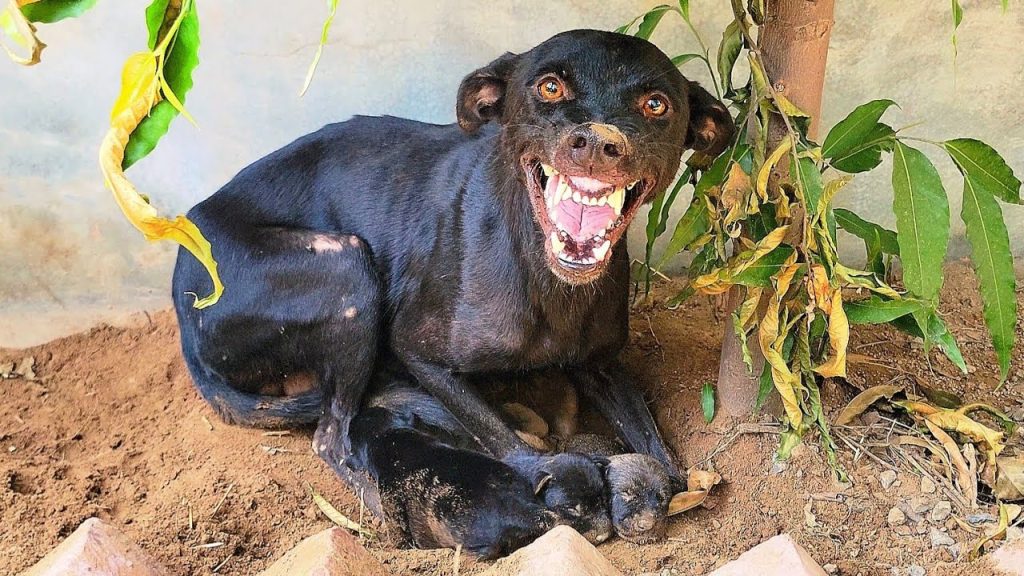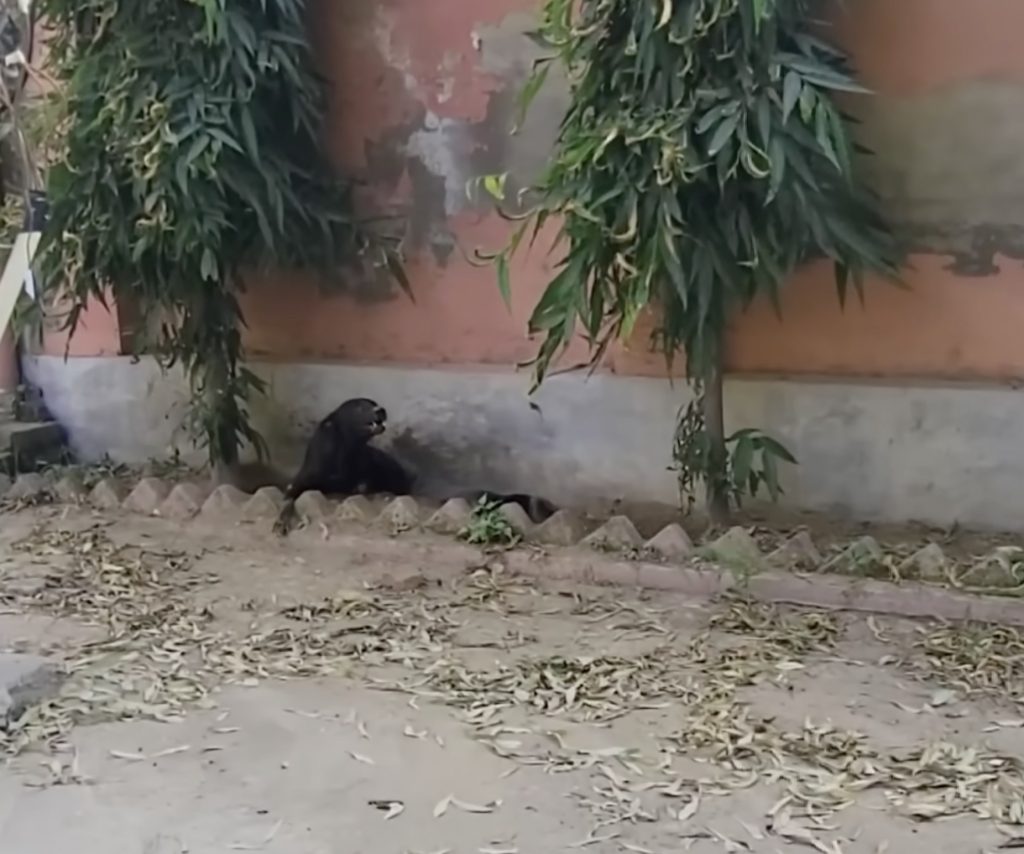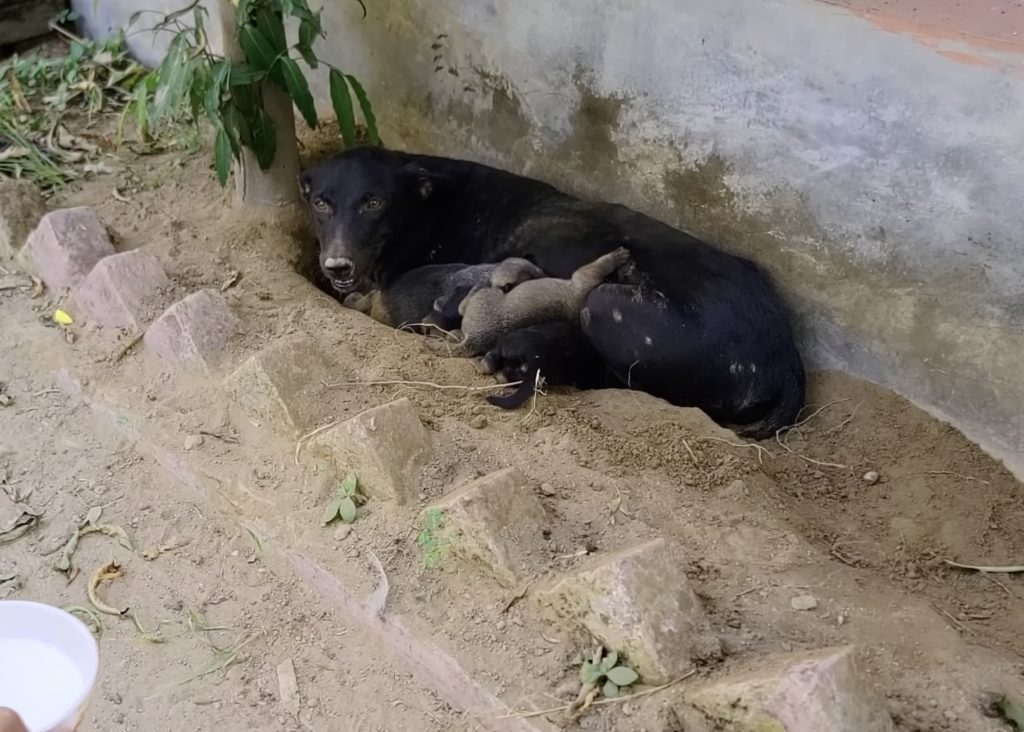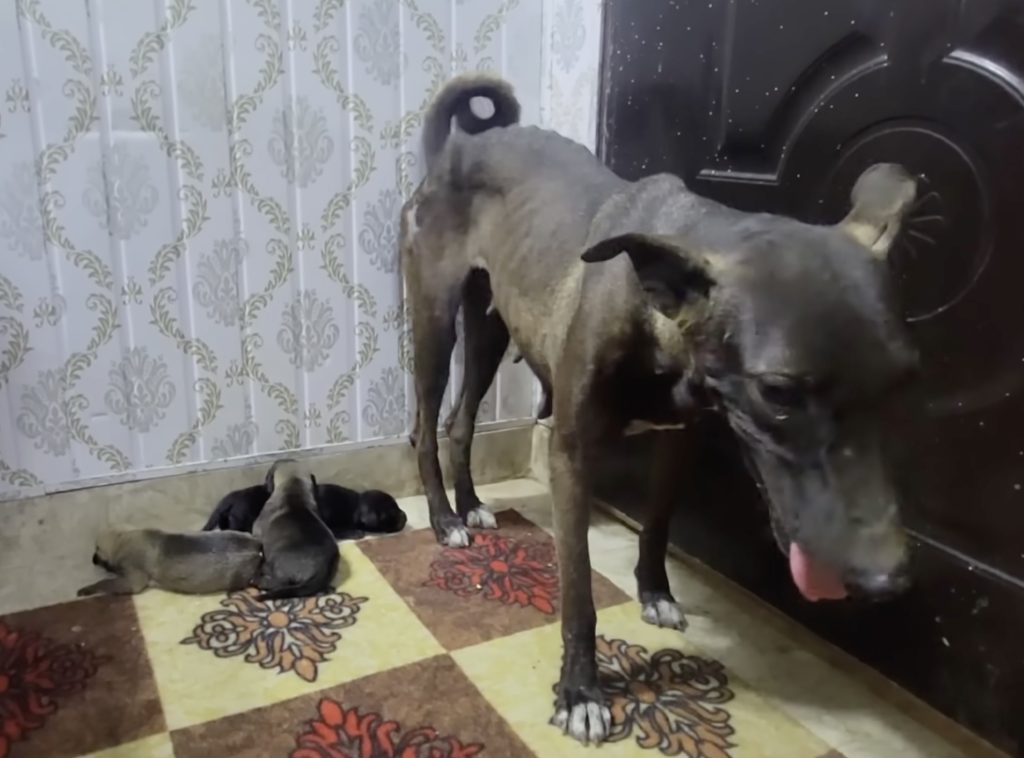On a quiet afternoon, a small team of animal rescuers drove through the edge of a forgotten neighborhood, the kind of place where stray animals often went unseen and unheard. Dust swirled through the warm air, and from a distance, they noticed something moving near a crumbling wall. As they got closer, their hearts tightened — a mother dog, painfully thin, stood guard over a tiny pile of newborn puppies nestled into the dirt. Her ribs showed with every breath, and her fur was matted from exhaustion, but her spirit was unbroken. Despite her weakened body, she stood tall, every muscle tense, her eyes sharp and filled with fear. She barked, growled, and lunged whenever anyone stepped closer, doing everything she could to protect her babies from the unknown figures approaching her fragile world.

The rescuers paused, realizing the depth of her fear. They could see her trembling, not just from hunger but from pure anxiety — a mother alone in a world that had never shown her kindness. Around her, other stray dogs lingered, sniffing curiously at the edges of her small patch of dirt. The rescuers knew time was running out. The vulnerable puppies, barely days old, wouldn’t survive long in this environment. But rushing in could cause her to panic, putting both her and her babies in danger. They needed to earn her trust first.
One rescuer gently placed a bowl of milk a few feet away, then stepped back. The mother dog barked again, her instincts pulling her between fear and desperation. The scent of food reached her, and her resolve started to waver. Hunger — that deep, gnawing pain she had endured for days — slowly outweighed her suspicion. She crept forward, step by cautious step, her eyes locked on the rescuers. Finally, she lowered her head and began to drink. Her body trembled as she lapped up the milk, each sip easing a bit of her suffering. In that small act of acceptance, something shifted — the barrier between fear and trust began to fade.
As she finished drinking, she turned back toward her puppies and lay down beside them, curling protectively around their tiny bodies. For the first time, the rescuers saw a glimpse of calm in her eyes. She was still alert but no longer frantic. Taking advantage of the moment, one rescuer moved slowly, speaking softly in reassuring tones. They carefully reached for the puppies — tiny, blind, and barely breathing — and placed them gently into a cardboard box lined with a soft towel. The mother watched every movement but didn’t resist. It was as if she understood that these humans weren’t there to harm her family but to save them.
Once the puppies were safely inside the box, the rescuers turned their attention to her. She hesitated, unsure whether to follow. One of them crouched low, extending a hand, not forcing her but inviting her. After a long, tense pause, she took a step forward. Then another. Her eyes softened, her tail moved slightly, and she allowed herself to be guided. Together, they lifted the box of puppies into their vehicle and helped her climb in beside them. As the doors closed, she let out a small, tired sigh — a sound that carried both exhaustion and relief.
The ride to safety was quiet. The rescuers spoke in low, soothing voices as the mother dog kept her gaze fixed on her babies. She nudged them gently, counting each one as if reassuring herself they were all still there. When they arrived at the shelter, a warm, softly lit room awaited them. For the first time, she and her puppies were indoors — away from danger, hunger, and the cold ground that had been their only home. The rescuers placed the box in a cozy corner and laid down a blanket. She hesitated only a moment before lying beside her puppies again, her body relaxing for the first time in what must have been weeks.
Hours passed, and the change was almost miraculous. Gone was the wild, frightened stray who had snarled at every approach. In her place lay a gentle, exhausted mother who finally felt safe enough to close her eyes. She nursed her puppies peacefully, her breathing slow and steady. The rescuers watched quietly from across the room, deeply moved by the transformation. There was no need for words — everything they had hoped for was right there before them.

As days turned into weeks, the little family thrived. The puppies grew stronger, their tiny whimpers replaced with playful squeaks. The mother’s fur began to shine again, and the once-empty look in her eyes was replaced with something far more beautiful — gratitude. She greeted the rescuers with soft tail wags and quiet trust. No longer was she the desperate dog guarding her babies against the world; she had become a symbol of resilience, proof of what compassion can do when shown at the right time.
In her calm presence, one could see the powerful truth that love and patience could heal even the deepest wounds. She had fought to protect her puppies with every ounce of strength she had left, and when she no longer could, someone stepped in to protect her. That silent exchange — of trust, of kindness, of hope — became the invisible thread that bound them together.

Her story reminds us that even in the harshest places, a simple act of care can change everything. The rescuers didn’t just save a starving dog and her newborns; they restored dignity to a soul that had only known fear. And in return, she gave them something equally profound — a glimpse into the heart of motherhood, fierce and unconditional, and the quiet gratitude of a creature who finally knew she was safe.
Now, as she lies peacefully with her puppies on a soft rug, eyes half-closed in the warmth of a gentle light, she seems to know that her fight is over. The world outside can no longer hurt her. She has food, comfort, and love — things she may never have known before. Watching her rest, one can feel the quiet beauty of redemption. It is not loud or dramatic. It is simple — a mother and her children, alive, safe, and together at last.

And that, perhaps, is the truest form of grace — not the absence of suffering, but the gentle hands that reach out to end it.





